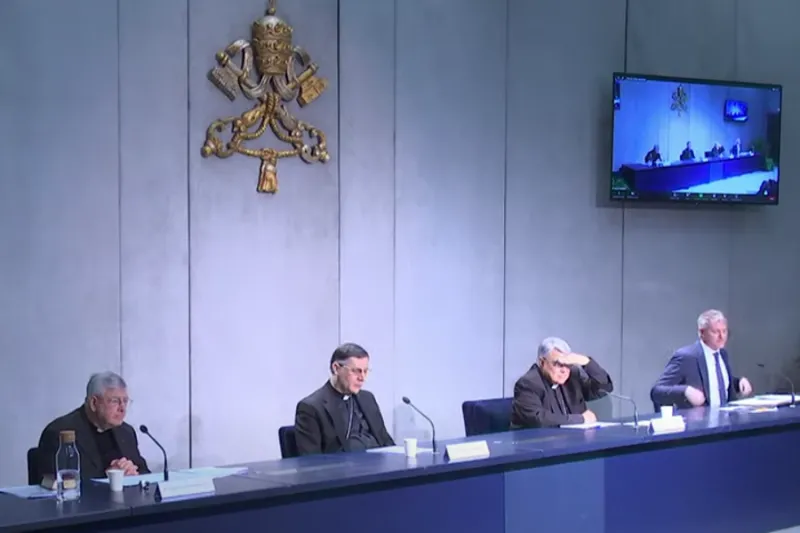
Vatican City, Mar 21, 2022 / 11:15 am (CNA).
A Vatican cardinal said on Monday that the inclusion of the words “extraordinary form” in the new apostolic constitution Praedicate evangelium is “a typo that should be corrected.”
Speaking at a live-streamed Vatican press conference on March 21, Bishop Marco Mellino, the secretary of Pope Francis’ Council of Cardinals, said the relevant section of the constitution was written before the publication of Traditionis custodes, the pope’s 2021 document restricting Traditional Latin Masses.
The new constitution, which has been nine years in the making, states in article 93 that the newly titled Dicastery for Divine Worship and the Discipline of the Sacraments “deals with the regulation and discipline of the Sacred Liturgy as regards the extraordinary form of the Roman Rite.”
“This norm … was formulated in this way before the release of the motu proprio and is a typo that should be corrected. The Holy Father has been notified of this,” Mellino told journalists.
During the more than two-hour press conference, speakers underlined that the new constitution permitted laymen and laywomen to lead some Vatican departments, which will be known as dicasteries after the document comes into force on June 5, the Solemnity of Pentecost.
They also discussed whether the text changed the relationship between the Roman Curia and local bishops’ conferences, and the likely impact of a two five-year term limit for heads of dicasteries.
Addressing the use of the term “extraordinary form,” Bishop Mellino said that article 93 should have been reformulated before its publication.
“In this sense, I would like to specify that it is only a matter of terminology,” he commented.
“But you will get the formulation when I find the time to submit the new formulation to the Holy Father,” he added.
In Traditionis custodes and the “responsa” that followed, Pope Francis indicated that the Old Mass should no longer be considered the “extraordinary form” of the Roman Rite, a term introduced by his predecessor Benedict XVI in Summorum Pontificum, his 2007 document liberalizing the celebration of Traditional Latin Masses.
Mellino further said that the new formulation would also need to take into account the question of the “Community of St. Peter,” by which he was likely referring to the Priestly Fraternity of St. Peter (FSSP), which has said that Pope Francis issued a decree in February allowing it to use the liturgical books in force in 1962.
At the press conference, which took place two days after the constitution was unexpectedly published only in Italian, Loup Besmond de Senneville, the head of the Vatican journalists’ association, read a statement expressing “astonishment” that the Vatican released the constitution on March 19, the ninth anniversary of the inauguration of Pope Francis’ pontificate, without any prior notice for such an important document for the universal Church.
Father Gianfranco Ghirlanda, a Jesuit priest and canon lawyer who was the former rector of the Pontifical Gregorian University, called the role for the laity in the Roman Curia outlined in the new constitution “innovative.”
He said that the power to carry out an office “is the same whether it comes from a bishop, a presbyter, a consecrated man or woman, or a layman or woman.”
“The power of government in the Church does not come from the sacrament of [Holy] Orders, but from the canonical mission,” Ghirlanda said.
Cardinal Marcello Semeraro, the prefect of what will now be known as the Dicastery for the Causes of Saints, said at the press conference that “dicastery” is a lay term, while “congregation is a clerical term.”
“A layman or laywoman can preside over a department, according to the criteria indicated,” the cardinal said.
Ghirlanda said that the new constitution sought to enhance local bishops’ conferences, as well as continental bodies of bishops. Bishops’ conferences are mentioned more than 50 times in the new document, compared to just twice in the previous Vatican constitution, the 1988 Pastor bonus.
But the Jesuit priest noted: “What is established by an episcopal conference cannot contradict the universal Magisterium, otherwise we are outside the ecclesial communion.”
Asked whether five-year terms for heads of dicasteries could create problems with continuity, Ghirlanda said that leaders who proved competent would be given a further five years in their posts.
He said that “people who stay too long in government positions can develop centers of power. And in the Church that is never appropriate. Turnover brings new ideas, new skills, openness.”
If you value the news and views Catholic World Report provides, please consider donating to support our efforts. Your contribution will help us continue to make CWR available to all readers worldwide for free, without a subscription. Thank you for your generosity!
Click here for more information on donating to CWR. Click here to sign up for our newsletter.






An “editing error”?
Or, just as likely that one of the reviewing dicasteries responsibly inserted this wording, and the ventriloquist zealots failed to “correct” it? If so, it would have been well to not flag this wording for their imposition of Procrustean bigotry. Better to let lying dogs sleep…(or whatever that adage is).
Still a chance, then, to elevate the (equally valid) Novus Ordo. Convergence of forms within one Rite, as Pope Benedict intended and as Pope Francis surely desires. So, perhaps the Holy Father will simply remain silent as he did with the dubia.
The “openness” thing, and a pastoral nod toward deepening unity over divisive homogeneity.
An editing error? Tsk. Should have used Latin.